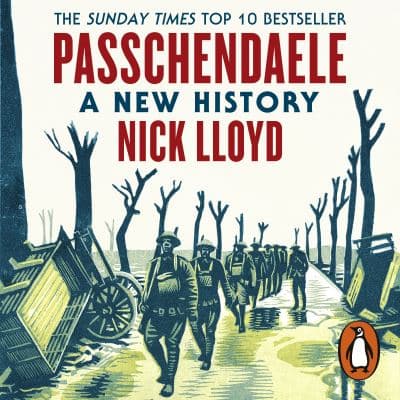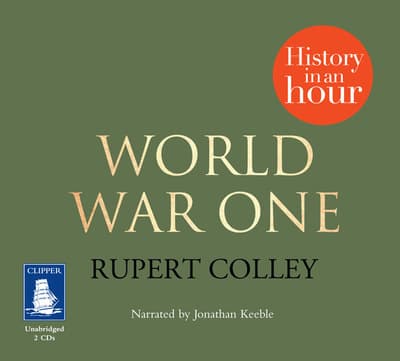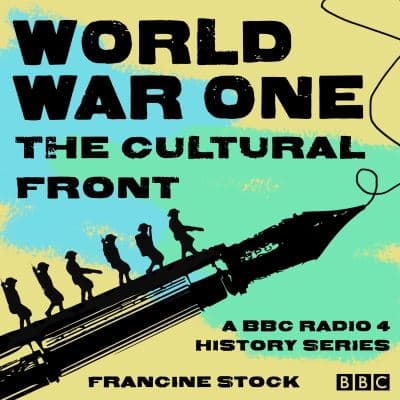War - WW1
Read by: Jon Beck
Duration: 8 hrs 30 mins
First published in 1945 this early, groundbreaking account of the psychological effects of war, recounted by means of vivid first-hand observation and anecdote, came at a time when shell-shock was equated with lack of moral fibre.
In 1940, Lord Moran became Churchill's doctor and his position as a one of history's most important war physicians was secured. His humane, considered observations, scientific analysis and proposed solutions constitute one of the great First World War sources. However, they are perhaps just as relevant to our own conflict-ridden times.
Read by: John Hobday
Duration: 7 hrs 15 mins
In this acclaimed study of the black presence in Britain during the First World War, Stephen Bourne illuminates fascinating stories of black servicemen of African heritage. These accounts of the fights for their 'Mother Country' are charted from the outbreak of war in 1914 to the conflict's aftermath in 1919, when black communities up and down Great Britain were faced with anti-black 'race riots' despite their dedicated services to their country at home and abroad.
Read by: Derina Dinkin
Duration: 8 hrs
Before 1871, Germany was not a nation but an idea. Its founder, Otto von Bismarck, had a formidable task at hand. How would he bring thirty-nine individual states under the yoke of a single Kaiser, convincing proud Prussians, Bavarians and Rhinelanders to become Germans? Once united, could the young European nation wield enough power to rival the empires of Britain and France – all without destroying itself in the process? In a unique study of five decades that changed the course of modern history, the story of the German Empire is told from its violent beginnings to its calamitous defeat in the First World War.
Read by: Michael St. John
Duration: 19 hrs
In 1914 boys as young as thirteen were caught up in the tide of patriotism sweeping the country, and enlisted for active service. Many were to serve in some of the bloodiest battles. Here their stories are told using diaries, letters and personal testaments from some of the last survivors.
Read by: Gerald Sanctuary
Duration: 9 hrs 45 mins
Only one man was twice awarded the Victoria Cross in World War I - Captain Noel Godfrey Chavasse, who served in the Royal Army Medical Corps. This is a study of a man who, while typical in so many ways of the Victorian/Edwardian middle class from whence he came, stands out for his simple courage and devotion to duty.
Read by: Clare Francis
Duration: 9 hrs 30 mins
Imprisoned in a remote Turkish POW camp during the First World War, two British officers, Harry Jones and Cedric Hill, cunningly join forces. To stave off boredom, Jones makes a handmade Ouija board and holds fake séances for fellow prisoners. One day, an Ottoman official approaches him with a query: could Jones contact the spirits to find a vast treasure rumoured to be buried nearby? Jones, a lawyer, and Hill, a magician, use the Ouija board - and their keen understanding of the psychology of deception-to build a trap for their captors that will lead them to freedom.
Read by: Mark Elstob
Duration: 19 hrs 6 mins
In the second volume of his landmark First World War trilogy, Professor Nick Lloyd tells the story for the first time of what Winston Churchill once called the 'unknown war': the vast conflict in Eastern Europe and the Balkans that brought about the collapse of three empires. Much has been written about the fighting in France and Belgium, yet the Eastern Front was no less bloody. Between 1914 and 1917, huge numbers of people - perhaps as many as 16 million soldiers and two million civilians - were killed, wounded or maimed in enormous battles that sometimes ranged across a front of 100 km in length.
Through intimate eyewitness reports, diary entries and memoirs - many of which have never been translated into English before - Lloyd reconstructs the full story of a war that began in the Balkans as a local struggle between Austria-Hungary and Serbia, and which sucked in Russia, Germany and Italy, right through to the final collapse of the Habsburg Empire in 1918.Read by: Antonia Davies
Duration: 14 hrs 30 mins
When the First World War broke out, the suffragettes suspended their campaigning and joined the war effort. For pioneering suffragette doctors (and life partners) Flora Murray and Louisa Garrett Anderson that meant moving to France, where they set up two small military hospitals amidst fierce opposition. Yet their medical and organisational skills were so impressive that in 1915 Flora and Louisa were asked by the War Ministry to return to London and establish a new military hospital in a vast and derelict old workhouse in Covent Garden's Endell Street. That they did, creating a 573-bed hospital staffed from top to bottom by female surgeons, doctors and nurses, and developing entirely new techniques to deal with the horrific mortar and gas injuries suffered by British soldiers.
Receiving 28,000 wounded men over the next four years, Flora and Louisa created such a caring atmosphere that soldiers begged to be sent to Endell Street. And then, following the end of the war and the Spanish Flu outbreak, the hospital was closed and Flora, Louisa and their staff were once again sidelined in the medical profession. The story of Endell Street provides both a keyhole view into the horrors and thrills of wartime London and a long-overdue tribute to the brilliance and bravery of an extraordinary group of women.
Read by: Daniel Gilles
Duration: 8 hrs
From the moment the first machine gun rang out over the Western Front, one thing was clear: mankind's military technology had wildly surpassed its medical capabilities. The war caused carnage on an industrial scale, and the nature of trench warfare meant that thousands sustained facial injuries. In The Facemaker, award-winning historian Lindsey Fitzharris tells the true story of the pioneering plastic surgeon Harold Gillies, who dedicated himself to restoring the faces of a brutalized generation.
Gillies, a Cambridge-educated New Zealander, established one of the world's first hospitals dedicated entirely to facial reconstruction. At a time when losing a limb made a soldier a hero but losing a face made him a monster to a society largely intolerant of facial differences, Gillies restored not just faces, but identities and spirits.
The Facemaker places Gillies's ingenious surgical innovations alongside the dramatic stories of soldiers whose lives were wrecked and repaired. The result is a vivid account of how medicine and art can merge, and of what courage and imagination can accomplish in the presence of relentless horror.Read by: Richard Worland
Duration: 2 hrs 30 mins
In this compelling anthology, the Poet Laureate Andrew Motion guides us through both the horror and the pity of that conflict, from the trenches of the Western Front to reflections from our own age. With a selection of our best-known war poets, this collection also returns lesser known pieces to the light and extends the selection right through to the present day.
Read by: Laurence Dobiesz
Duration: 10 hrs 49 mins
In the autumn of 1914 Europe was at war. On both the Western and Eastern fronts elaborate war plans lay in ruins and had been discarded in favour of desperate improvisation. In the West this resulted in the remorseless world of the trenches; in the East all eyes were focused on the old, beleaguered Austro-Hungarian fortress of Przemysl. The siege that unfolded at Przemysl was the longest of the whole war.
Alexander Watson has written one of the great epics of the First World War. Comparable to Stalingrad in 1942-3, Przemysl shaped the course of Europe's future. Neither Russians nor Austro-Hungarians ever recovered from their disasters. Using a huge range of sources, Watson brilliantly recreates a world of long-gone empires, broken armies and a cut-off community sliding into chaos.
Read by: Ian Wallace
Duration: 4 hrs
First hand accounts of some great air battles of World Wars l and 2 and the memories of the young men who survived virtually impossible odds.
Read by: Michael Palin
Duration: 7 hrs 46 mins
Some years ago a stash of family records was handed down to Michael Palin, among which were photos of an enigmatic young man in army uniform, as well as photos of the same young man as a teenager looking uncomfortable at family gatherings. This, Michael learnt, was his Great-Uncle Harry, born in 1884, died in 1916. He had previously had no idea that he had a Great-Uncle Harry, much less that his life was cut short at the age of 32 when he was killed in the Battle of the Somme. The discovery both shocked him and made him want to know much more about him.
The quest that followed involved hundreds of hours of painstaking detective work. Michael dug out every bit of family gossip and correspondence he could. He studied every relevant official document. He tracked down what remained of his great-uncle Harry's diaries and letters, and pored over photographs of First World War battle scenes to see whether Harry appeared in any of them. He walked the route Harry took on that fatal, final day of his life amid the mud of northern France. And as he did so, a life that had previously existed in the shadows was revealed to him.
Great-Uncle Harry is an utterly compelling account of an ordinary man who led an extraordinary life. A blend of biography, history, travelogue and personal memoir this is Michael Palin at his very finest.Read by: Bill Wallis
Duration: 7 hrs 56 mins
This is the life story of Harry Patch, 'The Last Fighting Tommy', from his childhood in rural Somerset, to his enlistment in the army and the horror of the Western Front.
Read by: Rob Johnson
Duration: 12 hrs 11 mins
Lawrence of Arabia is one of the most iconic figures of the First World War, seen by many as a heroic and romantic guerrilla leader in a period of savage and deeply impersonal industrial warfare. While Lawrence himself has been the subject of many biographies, the context of his war in the desert, and his ideas on war itself, are less well known.
Lawrence of Arabia on War is a study of those ideas and of his campaign of irregular warfare which has informed tactical theory and decision-making down to the present day, juxtaposed alongside the operations conducted by the Ottoman Empire and those of the Allied army in Palestine.
Read by: John Hobday
Duration: 9 hrs
The words of the servicemen and women, who served their country in the wars of the 20th century have been forever preserved thanks to a team of volunteers and the West Sussex County Library Service. This volume contains edited interviews with local Sussex veterans who served in the Great War.
Read by: Miscellaneous
Duration: 6 hrs 30 mins
World War I saw an unprecedented loss of life in Western Europe, and destruction on a scale no one alive had ever seen. All those who experienced it were irrevocably changed, including many writers and artists upon whose oeuvre it left an indelible mark. This captivating series examines the impact of the war on artists and thinkers through the prism of their great works. In each episode, a leading figure from the worlds of science, culture and the arts reflects on a single iconic piece, and discusses how the events of 1914-18 shaped its creation.
Read by: John Hopkins
Duration: 5 hrs 15 mins
The Missing of the Somme has become a classic meditation upon war and remembrance. It weaves a network of myth and memory, poetry and sculptures, graveyards and ceremonies that illuminate our understanding of, and relationship to, the Great War.
Read by: Colin Burbidge
Duration: 5 hrs 30 mins
The story of the effect of the First World War on The Lee, a Buckinghamshire village, based on the village magazine. The Lee Magazine was introduced by the lord of the manor, Sir Arthur Liberty, the founder of the Regent Street store.
Read by: Joshua Levine
Duration: 11 hrs 15 mins
The men who joined the Royal Flying Corps in 1914 were the original heroes of flying, treading into unknown territory, and paving the way for later aerial combat. The adventures of these men are almost totally unknown, and this book tells their story, in their own words, for the first time.
Read by: John Hunter
Duration: 16 hrs 30 mins
The extraordinary story of a German-Turkish plot in 1914 to overthrow British hold in India and the Russians in Central Asia.
Read by: Mark Elstob
Duration: 12 hrs 28 mins
Between July and November 1917, in a small corner of Belgium, more than 500,000 men were killed or maimed, gassed or drowned - and many of the bodies were never found. The Ypres offensive represents the modern impression of the First World War: splintered trees, water-filled craters, muddy shell-holes.
The climax was one of the worst battles of both world wars: Passchendaele. The village fell eventually, only for the whole offensive to be called off. But, as Nick Lloyd shows, notably through previously unexamined German documents, it put the Allies nearer to a major turning point in the war than we have ever imagined.
Read by: Alison Dowling
Duration: 10 hrs 43 mins
The Third Battle of Ypres, ending in a desperate struggle for the ridge and little village of Passchendaele, was one of the most appalling campaigns in the history of warfare. A million Tommies, Canadians and Anzacs assembled at the Ypres Salient in summer of 1917, mostly raw young troops keen to do their bit for King and Country. This book tells their tale of mounting disillusion amid mud, terror and increasingly desperate attacks, yet it is also a story of immense courage, comradeship, high spirits and hope.
Read by: Alison Dowling
Duration: 15 hrs 43 mins
'On the face of it,' writes Lyn Macdonald, 'no one could have been less equipped for the job than these gently nurtured girls who walked straight out of Edwardian drawing rooms into the manifest horrors of the First World War ...' Yet the volunteer nurses rose magnificently to the occasion.
In leaking tents and draughty huts they fought another war, a war against agony and death, as men lay suffering from the pain of unimaginable wounds or diseases we can now cure almost instantly. It was here that young doctors frantically forged new medical techniques - of blood transfusion, dentistry, psychiatry and plastic surgery - in the attempt to save soldiers shattered in body or spirit. And it was here that women achieved a quiet but permanent revolution, by proving beyond question they could do anything.
Read by: Mark Meadows
Duration: 10 hrs 40 mins
Jack Martin was a 32-year-old clerk at the Admiralty when he was called up to serve in the army in September 1916. These diaries, written in secret, present the Great War with heartbreaking clarity.
Read by: Gordon Griffin
Duration: 12 hrs 52 mins
By the end of the First World War, the whereabouts of more than half a million British soldiers were unknown. Most were presumed dead, lost forever under the battlefields of northern France and Flanders.
In The Searchers, Robert Sackville-West brings together the extraordinary, moving accounts of those who dedicated their lives to the search for the missing.
It was a search that would span a century: from the department set up to investigate the fate of missing comrades in the war's aftermath to the present day, when DNA profiling continues to aid efforts to recover, identify and honour these men. Giving prominence to the personal battles of those left behind, The Searchers brings the legacy of war vividly to life in a testament to the bravery, compassion and resilience of the human spirit.
Read by: Alison Dowling
Duration: 16 hrs 30 mins
The year 1916 was one of the great turning-points in British history: as the youthful hopes of a generation were crushed in a desperate struggle to survive, and traditional attitudes to authority were destroyed for ever.
On paper, few battles have ever been so meticulously planned. Yet while there were good political reasons to launch a joint offensive with a French Army demoralized by huge casualties at Verdun, the raw troops on the ground knew nothing of that. A hundred and fifty thousand were killed in the punishing shellfire, the endless ordeal of attack and counter-attack; twice that number were left maimed or wounded.
Here, almost for the first time, Lyn Macdonald lets the men who were there give their own testimony. Their stories are vivid, harrowing, sometimes terrifying - yet shot through with humour, immense courage and an astonishing spirit of resilience.
Read by: Gerald Sanctuary
Duration: 40 hrs
From the start of the RAF in 1918, to its continuing role in the 21st century, all aspects of life in the service are shown through 193 personal reminiscences.
Read by: Richard Dannatt
Duration: 11 hrs 12 mins
The British Army won a convincing series of victories between 1916 and 1918. But by 1939 the British Army was an entirely different animal. The hard-won knowledge, experience and strategic vision that delivered victory after victory in the closing stages of the First World War had been lost.
In the inter-war years there was plenty of talking, but very little focus on who Britain might have to fight, and how. Victory to Defeat clearly illustrates how the British Army wasn't prepared to fight a first-class European Army in 1939.
It is a captivating history of the mismanagement of a war-winning army. It is also a stark warning that we neglect to understand who our enemy might be, and how to defeat him, at the peril of our country.
Read by: Claire Francis
Duration: 7 hrs
1914: war has broken out across Europe and beyond. Nothing will ever be the same again for those caught up in the conflict. This moving collection of untold stories from nine much-loved authors, explores how the First World War changed and shaped the lives of women forever.
Read by: Tony Lister
Duration: 3 hrs 30 mins
Jack Seely tells the story of a thoroughbred horse he took to France in 1914 where they survived five years of bombs and bullets to lead a cavalry charge in 1918, before returning home. They continued to ride together until 1938, when their combined ages totalled 100.
Read by: Mark Elstob
Duration: 20 hrs 41 mins
In the annals of military history, the Western Front stands as an enduring symbol of the folly and futility of war. However, The Western Front, by bestselling military historian Nick Lloyd, reveals that the story is not, as so many assume, one of pointlessness and stupidity. Rather, it is an epic triumph against the odds. With a cast of hundreds and a huge canvas of places and events, Lloyd tells the whole tale, revealing what happened in France and Belgium between August 1914 and November 1918 from the perspective of all the main combatants - including French, British, Belgian, US and, most importantly, German forces.
Drawing upon the latest scholarship on the war, wrongly overlooked first-person accounts, and archival material from every angle, Lloyd examines the most decisive campaigns of the Great War and explains the achievements that have been too long obscured by legends of mud, blood and futility. Far from being an arena of static, stale attrition - and despite mistakes and wrong turns along the way - the Western Front was a 'cauldron of war' that saw unprecedented innovation, adaptation and tactical development. Lloyd conveys the visceral assault of the battlefield, and skilfully moves the focus in and out, giving both the bigger picture and telling detail. He recreates the decision-making and experiences of the war as it was at the time as well as with hindsight, and in doing so redefines our understanding of this crucial theatre in this monumental tragedy.Read by: Jonathan Keeble
Duration: 1 hr 30 mins
The ‘Great War’, from July 1914 to November 1918, was without parallel. It brought to an end four dynasties, ignited revolution, and forged new nations. This is a concise account of the unprecedented battles on land, sea and in the air and describes the Home Front, espionage, and the politics behind them.
Read by: Miscellaneous
Duration: 6 hrs 30 mins
Each series focuses on a specific year of the conflict, beginning with 1914, as the written word was mobilised; the music industry embraced both patriotism and escapism; and painters including Kandinsky created some of their most powerful work. Stock shows how the aftershocks of war sparked the rise of modernism and the avant-garde in 1915, and looks at how trauma was addressed in the works of Freud and the compositions of Debussy. Moving on to the following year, she demonstrates how the carnage at Verdun and the Somme inspired Dadaism, galvanised creators from Picasso to Apollinaire - and made the tank into an unlikely icon on the home front.
- Previous<
- Page1
- Next>




























